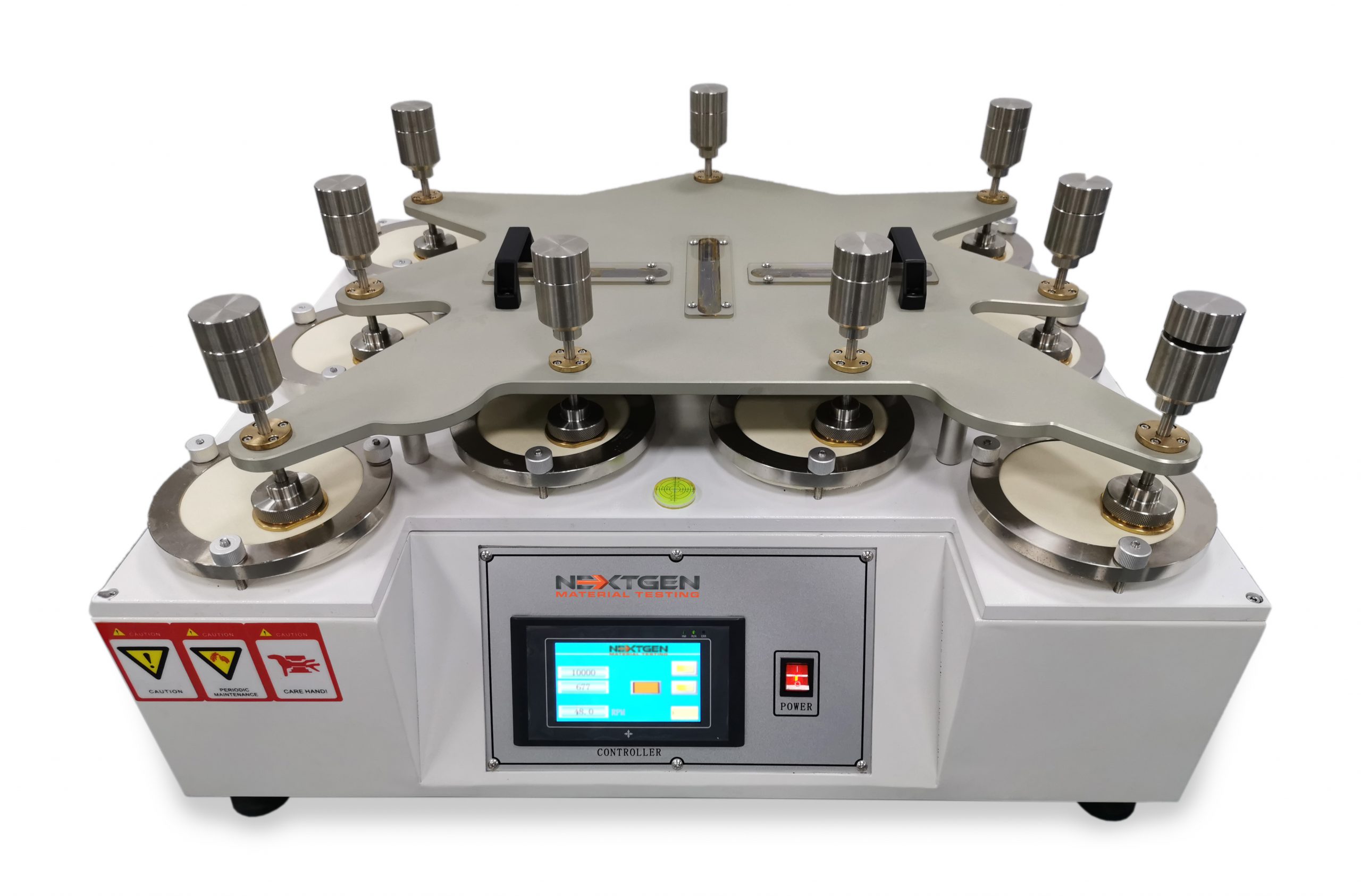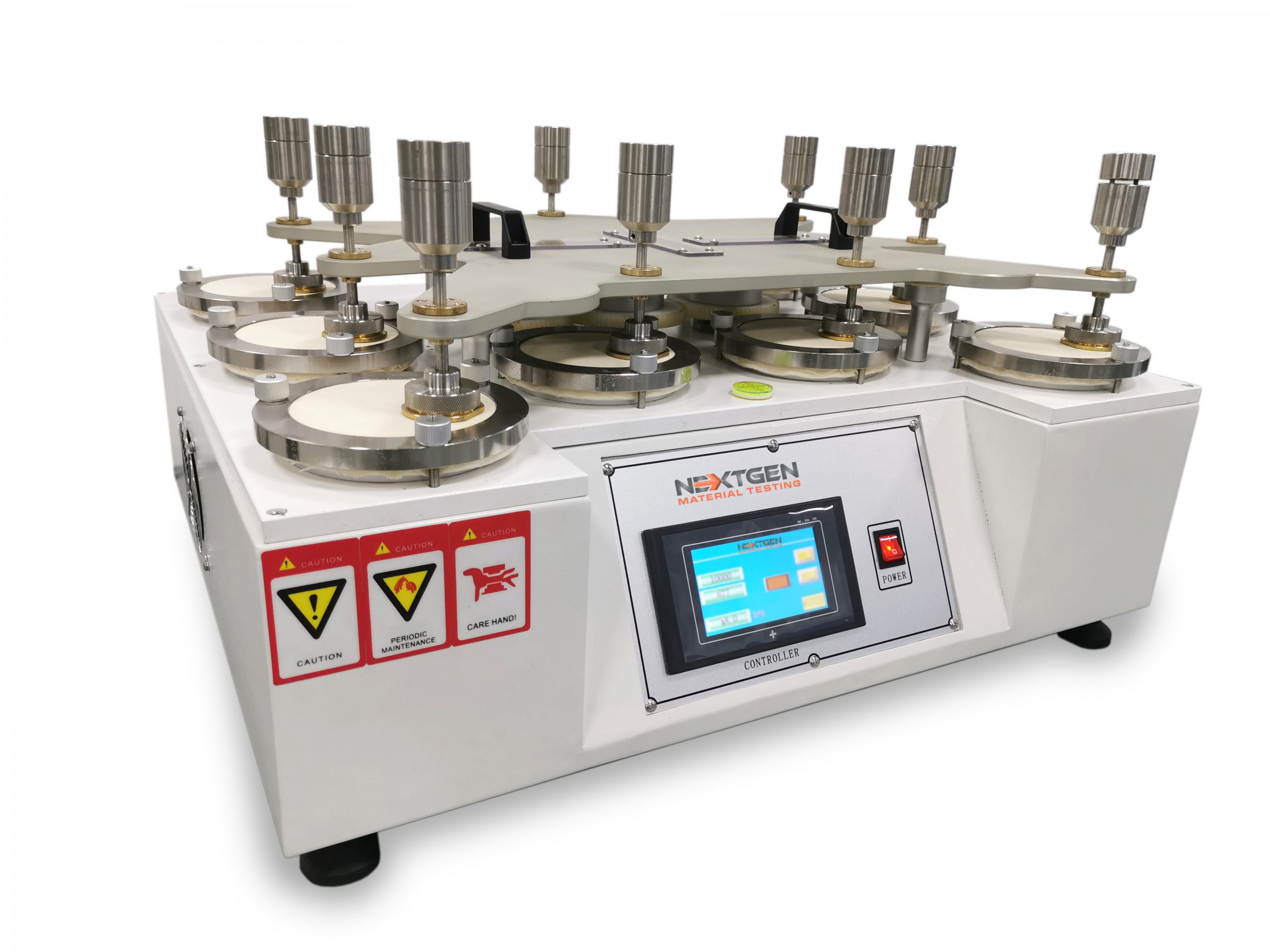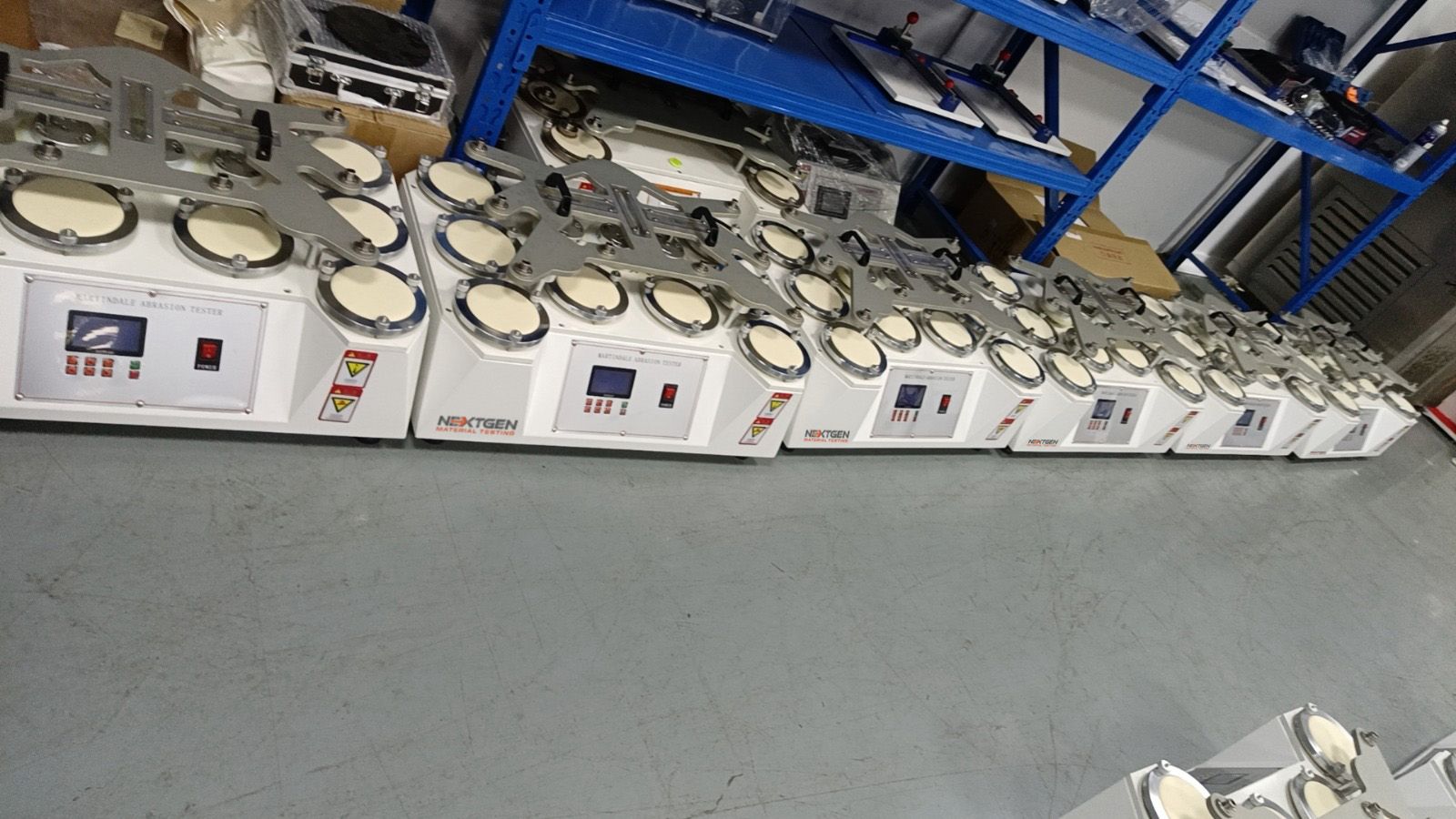Rubber Testing Equipment
Standards
ISO 12945-2, BS EN 3424/5690, JIS L1096, Next 18/18a/18b, M&S 17/19/19C, GB/T 13775, ISO 12947-4, ISO 12947-3, ISO 12947-2, ISO 12947-1, NEXT 16, SFS 4328, IWTO 40-88, IWSTM 112/196, DIN 53863/53865, BS EN 388/530, ISO 5470-2, ASTM 4966/4970, ISO 20344






Description
The GenDale - 9-Station Martindale Abrasion Tester is mainly used to test shoe fabric, shoe lining, and many other types of shoe related materials. The unit can test up to four specimens at the same time for abrasion. The fabric specimen is measured by having rubbing applied on it via a complex direction of back and forth motion. The accuracy of abrasion strength is determined by the specific number of cycles conducted until a hole appears in the test area of the fabric specimen. Read more in our Mega Blog.
Features & Standard Configuration
- PLC, programmable control with a large touch-screen interface
- Adjustable test speed
- Martindale Abrasion Tester with 9 Stations
- Standard sample holders and 9 and 12kpa Weights are included
- Manual
- Certificate of Quality.
Martindale Abrasion Tester Technical Specifications
|
GenDale |
|
|
Speed |
50-2r / min |
|
Dimensions |
34.85 x 23.6 x 16-inches / 88.5 x 60 x 41cm |
|
Power Supply |
110V / 220V 1ph |
|
Abrasion Test |
Max stroke of movement: 60.5+/-0.5mm. Weight of holder and spindle: 200+/-1g |
|
Pilling Test |
Max stroke of movement: 24+/-0.5mm Weight of holder and spindle: 155+/-1g |
Annual Calibration Services
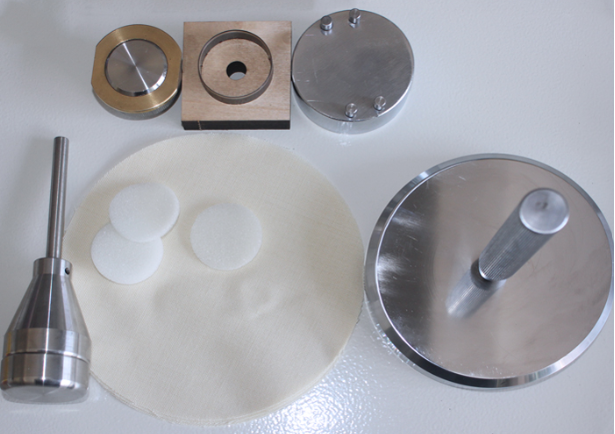
NextGen collaborates with a worldwide network of agencies to facilitate the hassle-free calibration of the weights on your Martindale Abrasion Testing system. To benefit from this service, simply inform us of your interest by requesting a quotation. Kindly include your model number and address, and we will handle the entire process for you.
Who Can Benefit from the Martindale Abrasion Tester?
The GenDale is fit for diverse range of industries and applications, offering benefits for:
-
Footwear Manufacturers: Ideal for testing shoe fabric, shoe lining, and various shoe-related materials.
-
Textile Industry: Ensures precise and simultaneous testing of up to four specimens, enhancing efficiency in material assessment.
-
Quality Assurance Departments: Equipped with a programmable control and touch-screen interface, guaranteeing precision in measuring abrasion strength.
FAQs
Yes, the 9-Station Martindale Abrasion Tester, particularly the GenDale model, conforms to comply with the ISO 12945-2 standard. This standard is crucial in the textile industry as it outlines methods for determining a fabric's propensity to surface pilling, fuzzing, or matting. Specifically, it employs the Modified Martindale method, which simulates fabric abrasion under controlled conditions.
GenDale Martindale Abrasion Tester compliance with ISO 12945-2 is essential for quality control and product development in the textile sector. This standard ensures that the textiles tested can withstand regular wear without significant appearance degradation due to pilling or fuzzing. The machine's design and functionality align with standard requirements, offering precise and reliable testing results.
This alignment with ISO 12945-2 underscores the tester's utility in the textile industry, where maintaining fabric quality and longevity is paramount. Manufacturers and quality assurance departments can rely on the GenDale model to ensure that their products meet the high standards expected in the market, enhancing consumer trust and product reliability.
Click here to learn more about the product or here to receive a personalized quote.
Yes, the 9-Station Martindale Abrasion Tester aligns with the JIS L1096 standard, which specifies testing methods for general characteristics of woven and knit fabrics. JIS L1096 is a comprehensive standard encompassing various fabric quality evaluation techniques. It includes tests for measuring breaking strength, tearing strength, air permeability, and warmth retention, among others.
The 9-Station Martindale Abrasion Tester, particularly suitable for abrasion testing, can be effectively used within JIS L1096 to assess the abrasion resistance of woven and knitted fabrics. This is crucial for determining the durability and suitability of these materials in everyday use. The tester’s design and functionality make it a suitable tool for executing the tests outlined in JIS L1096, ensuring that fabrics meet the high standards required for consumer and industrial applications.
The Martindale Abrasion Tester's compliance with JIS L1096 underscores its versatility and utility in the textile industry, where maintaining fabric quality and longevity is essential. It provides manufacturers and quality assurance departments with a reliable method to test and verify the resilience and performance of their textile products, ensuring adherence to recognized industry standards.
Click here to learn more about the product or here to receive a personalized quote.
Yes, the 9-Station Martindale Abrasion Tester aligns with the ISO 12947-4 standard, which is crucial in assessing fabrics' appearance change after undergoing abrasion testing. The Martindale method, used in this standard, is precisely what the 9-Station Martindale Abrasion Tester is designed for. This tester measures the resistance of shoe fabrics, linings, and other related materials to abrasion, making it an ideal match for ISO 12947-4's requirements.
As a result of the machine's capability to test four specimens at once with a complex directional rubbing motion, it is possible to accurately assess fabric durability and resistance to wear according to ISO 12947-4 criteria. Its technical specifications, such as the fact that it can be adjusted for test speed and that it can be controlled by a programmable touchscreen interface, also reinforce its compliance with this standard.
Click here to learn more about the product or here to receive a personalized quote.
Yes, the 9-Station Martindale Abrasion Tester is designed to perform abrasion tests that align with ISO 12947-3. The purpose of this standard is to determine the mass loss of abrasion test specimens after they have been subjected to abrasion tests, a crucial process for determining the durability of the fabric specimens. To perform this kind of testing, it is necessary to have a tester that applies a complex directional rubbing motion to four specimens all at once.
Martindale Abrasion Tester's technical specifications, including its adjustable test speeds, programmable control, and large touch-screen interface further support its capability to conduct tests following ISO 12947-3, as well as its ability to conduct tests by ISO 12947-3's recommended use procedures. As a result of these features, precision and repeatability are ensured in the testing process, which is crucial for determining the fabric mass lost due to abrasion accurately.
Click here to learn more about the product or here to receive a personalized quote.
Yes, the 9-Station Martindale Abrasion Tester has been certified as complying with ISO 12947-2 standards. This standard specifies the process for determining specimen breakdown through periodic inspection, a procedure that the Martindale Abrasion Tester is equipped to perform. The tester is designed to assess textile durability, including shoe fabric and shoe lining, through an abrasion testing process. The ISO 12947-2 methodologies are well suited to this method, which makes it perfect for ISO 12947-2
The tester's ability to simultaneously test up to four specimens with a precise rubbing motion ensures its effectiveness in measuring the end-point of tests as per ISO 12947-2. Additionally, the tester's technical specifications, such as its PLC programmable control and large touch-screen interface, facilitate accurate and repeatable testing, which is critical for adhering to ISO 12947-2 standards.
Click here to learn more about the product or here to receive a personalized quote.
Yes, the 9-Station Martindale Abrasion Tester is fully compliant with ISO 12947-1 standard. This section of the ISO 12947 series outlines the requirements for the Martindale abrasion testing apparatus, specifying the parameters for evaluating textile materials' abrasion resistance. The 9-Station Martindale Abrasion Tester, specifically designed for such purposes, fits these requirements perfectly.
This tester's features, including its PLC programmable control and large touch-screen interface, align with ISO 12947-1's specifications for abrasion testing equipment. Its ability to test up to four specimens simultaneously under controlled conditions ensures a high degree of precision and repeatability, which are critical aspects of the ISO standard. In addition to its adjustable test speed, it also includes standard sample holders and weights.
Moreover, the tester's technical dimensions and power supply requirements are in line with ISO 12947-1 typical specifications. These aspects, combined with the machine's robust design, guarantee reliable performance in abrasion testing, which is a key requirement of the standard.
Click here to learn more about the product or here to receive a personalized quote.
Yes, the 9-Station Martindale Abrasion Tester is designed according to ISO 5470-2 standard. This standard pertains to the determination of the abrasion resistance of rubber- or plastic-coated fabrics using the Martindale method, which is the exact testing procedure the Martindale Abrasion Tester is equipped for. The tester's functionality in applying a controlled, complex rubbing motion to test specimens makes it ideal for executing ISO 5470-2 methods.
The tester's capabilities, including its PLC programmable control, adjustable test speed, and touch-screen interface, enable it to accurately simulate both wet and dry abrasion conditions as per the standard's specifications. Additionally, the ability to test multiple specimens simultaneously ensures efficient and effective abrasion resistance testing.
The technical features and testing capabilities of the 9-Station Martindale Abrasion Tester align with the ISO 5470-2 standard, making it a suitable instrument for testing the abrasion resistance of rubber- or plastics-coated fabrics in compliance with this international standard.
Click here to learn more about the product or here to receive a personalized quote.
Yes, the 9-Station Martindale Abrasion Tester is suitable for use according to ISO 20344 standards. Even though ISO 20344 is primarily concerned with personal protective footwear, it also includes tests for abrasion resistance, which is an important component of the durability of footwear. This Martindale Abrasion Tester is specially designed to test the abrasion resistance of shoe fabrics and linings, making it a suitable tool for some of the tests outlined in ISO 20344, which are all related to the abrasion resistance of shoe fabrics and linings.
The tester's ability to perform controlled abrasion tests on up to four specimens simultaneously aligns with the requirements for assessing the durability of protective footwear materials. Its features, including PLC programmable control, touch-screen interface, and adjustable test speeds, ensure precise and reliable testing, which is essential for ISO 20344 standards.
Click here to learn more about the product or here to receive a personalized quote.
The GenDale - 9-Station Martindale Abrasion Tester is expertly designed for testing the durability and resistance to abrasion of various shoe-related materials, including shoe fabric and shoe lining. This specialized equipment can simultaneously test up to four specimens, streamlining the abrasion resistance evaluation process.
The tester operates by applying a complex, back-and-forth rubbing motion to fabric specimens. This method of abrasion is fundamental in assessing material endurance. The determination of a fabric's abrasion strength is based on the specific number of cycles performed until a hole forms in the test area of the fabric specimen. Such precise testing is vital for industries focused on producing high-quality, durable footwear, as it provides valuable insights into the material's longevity and suitability for shoe manufacturing.
The 9-Station Martindale Abrasion Tester's capability to deliver accurate and reliable results makes it an indispensable tool for footwear manufacturers, quality assurance departments, and textile laboratories aiming to ensure the highest standards in material durability and performance.
Click here to learn more about the product or here to receive a personalized quote.
The GenDale - 9-Station Martindale Abrasion Tester tests up to four specimens for abrasion. This feature is particularly advantageous in environments where efficiency and speed are key factors. The ability to test multiple samples at once accelerates the testing process but also ensures uniform testing conditions for all specimens. This is crucial for consistent and reliable results.
The simultaneous testing capability of this tester allows for a more comprehensive materials analysis. In industries such as footwear manufacturing and textile quality control, where material durability is critical, this feature proves invaluable. It enables manufacturers and quality assurance teams to compare the abrasion resistance of various materials under the same conditions, facilitating informed material selection decisions.
Furthermore, this multi-specimen testing approach is cost-effective and resource-efficient. It reduces the need for repetitive individual tests, saving time and minimizing labor costs. The GenDale - 9-Station Martindale Abrasion Tester, with its capacity to handle multiple specimens concurrently, represents a significant advancement in abrasion testing technology, offering a practical and efficient solution for industries focused on material durability and quality.
Click here to learn more about the product or here to receive a personalized quote.
The GenDale - 9-Station Martindale Abrasion Tester employs a sophisticated method to evaluate fabric specimen abrasion resistance. This process involves a complex, back-and-forth rubbing motion to the fabric. This motion is carefully designed to replicate the various types of wear and tear fabrics encounter every day. By simulating these conditions, the tester provides a realistic and accurate measure of fabric durability.
This testing method simulates real-world abrasion conditions. This is crucial in industries such as footwear manufacturing, where understanding how materials withstand repeated use is essential. The Martindale Abrasion Tester's approach ensures that the materials tested are subjected to conditions that closely resemble actual wear scenarios.
Moreover, this method of measuring abrasion resistance is critical in quality control processes. It allows manufacturers to determine the longevity and performance of materials before using them in final products. By ensuring that only materials that meet specific abrasion resistance standards are utilized, manufacturers can guarantee higher quality and more durable products for their customers. The Martindale Abrasion Tester, with its complex rubbing motion, plays a pivotal role in this quality assurance process.
Click here to learn more about the product or here to receive a personalized quote.
The GenDale - 9-Station Martindale Abrasion Tester determines the abrasion strength of fabric specimens with precision based on the number of cycles executed until a hole forms in the test area of the fabric. This process involves subjecting the fabric to controlled abrasion, and tracking the number of cycles it endures before showing significant wear, typically indicated by a hole.
The count of cycles until a hole appears is a critical metric. It offers a quantifiable and objective measure of the fabric's resistance to abrasion, providing a clear endpoint for the test. This method is especially valuable in industries where fabric durability is paramount, such as footwear and textiles. The data obtained from this testing method helps in comparing the resilience of different materials under similar conditions, guiding material selection for various applications.
Moreover, this testing approach emphasizes durability's importance in material quality. By establishing a standard measure of wear resistance, the Martindale Abrasion Tester assists manufacturers in ensuring high durability standards. This is crucial in maintaining consumer trust and satisfaction, particularly in sectors where material longevity is a key selling point.
Click here to learn more about the product or here to receive a personalized quote.
The GenDale - 9-Station Martindale Abrasion Tester is equipped with an advanced PLC (Programmable Logic Controller) and a large touch-screen interface, which are key components of its control system. The PLC offers enhanced programmability, allowing precise manipulation of testing parameters. This level of control is crucial for abrasion tests' accuracy and consistency. The programmable nature of the PLC means that tests can be customized to meet specific standards or requirements, making the tester versatile across different applications.
The large touch-screen interface is another significant feature that enhances the user experience. It provides an intuitive and user-friendly means of interacting with the tester. Operators can easily set up tests, monitor ongoing processes, and view results, all through a straightforward, interactive display. The touch-screen interface simplifies the operation of complex machinery, making it accessible to users with limited experience.
Together, the PLC and touch-screen interface make the Martindale Abrasion Tester a state-of-the-art instrument. They combine to offer a balance of advanced technological capabilities and ease of use. This makes the tester not only highly effective at performing its intended functions but also user-friendly and adaptable to various testing environments.
Click here to learn more about the product or here to receive a personalized quote.
The adjustable test speed feature of the GenDale - 9-Station Martindale Abrasion Tester is a crucial functionality that significantly enhances its testing versatility. This feature allows users to vary the speed at which abrasion tests are conducted. This offers the flexibility to cater to a wide range of testing standards and material specifications. The ability to adjust speed is vital for accurately simulating wear and tear conditions. These conditions can vary greatly depending on the intended use of the material being tested.
For instance, materials used in high-wear applications may require testing at higher speeds to mimic more intense usage, while more delicate materials might be tested at lower speeds. This adaptability ensures that the abrasion resistance measurements are relevant and realistic, reflecting the actual conditions the materials will face in practical use.
Moreover, the adjustable speed feature contributes to test results' precision and reliability. By enabling the tester to match the specific requirements of various fabrics and industry standards, it ensures that the abrasion resistance data obtained is both accurate and applicable, providing valuable insights for material development and quality control processes.
Click here to learn more about the product or here to receive a personalized quote.
The 9-station design of the GenDale - Martindale Abrasion Tester is one of its defining features which is a significant boost to its ability to perform tests. With this multi-station setup, it is possible to test nine different fabric specimens at the same time simultaneously, greatly increasing the throughput of the testing process.
It is especially beneficial for industrial settings or research laboratories where high-volume testing is a routine requirement and high-volume testing is a routine requirement. It not only enhances productivity by reducing the time required for multiple tests but also ensures consistency across tests, as each station operates under the same conditions. Uniformity is crucial for comparative analysis and maintaining test results' integrity.
The 9-station design of the Martindale Abrasion Tester makes it one of the most efficient and reliable tools for extensive abrasion resistance testing, essential for the quality control process and the research of new materials.
Click here to learn more about the product or here to receive a personalized quote.
The inclusion of standard sample holders and 9 and 12kpa weights in the GenDale - Martindale Abrasion Tester plays a pivotal role in ensuring the precision and standardization of abrasion tests. Standard sample holders are crucial for securing fabric specimens consistently, guaranteeing that each test is conducted under uniform conditions. Consistency is the key to reliable and repeatable results, a cornerstone of material testing.
The 9 and 12kpa weights, on the other hand, are crucial to applying the correct pressure to the specimens. These weights are meticulously calibrated to provide the necessary force, simulating real-world wear and tear conditions accurately. The ability to adjust the pressure of these weights allows a broad range of tests to be conducted. This accommodates various materials and industry standards.
Together, these components - the sample holders and calibrated weights - enhance the tester's versatility and accuracy. They ensure that the abrasion tests conducted are consistent with industry norms but also adaptable to specific research or quality control requirements. This makes the Martindale Abrasion Tester an invaluable tool in textile testing. It delivers precise, reliable data crucial for material selection and product development in the textile and footwear industries.
Click here to learn more about the product or here to receive a personalized quote.
The Certificate of Quality for the GenDale - Martindale Abrasion Tester is a significant document, reflecting the tester's adherence to high-quality standards. This certificate is a testament to the equipment's rigorous testing and validation process, ensuring its reliability and accuracy in abrasion testing. It gives users confidence that the tester meets industry-specific standards and safety norms.
Having a Certificate of Quality is vital for laboratories and manufacturers, as it supports compliance with regulatory requirements and quality control procedures. It assures that the abrasion tests conducted with the equipment are trustworthy and consistent with recognized standards. This certification is especially helpful in fields where precise material testing is critical, such as textile quality control and product development. It not only enhances the credibility of the testing process but also contributes to maintaining high standards of product quality and consumer safety. The certificate effectively serves as a guarantee of the tester's quality and reliability, making it an essential aspect of the equipment's overall value and usefulness.
Click here to learn more about the product or here to receive a personalized quote.
The GenDale - Martindale Abrasion Tester is characterized by its versatile speed range, which is adjustable from 50 revolutions per minute (r/min) to two revolutions per minute (r/min). Having a broad range of speed capabilities is a critical feature because it enables the tester to accommodate different types of abrasion testing requirements. The lower speed limit allows for gentle abrasion, suitable for delicate fabrics, while the higher speed setting is ideal for more robust materials that require rigorous testing.
This flexibility in speed adjustment is crucial when it comes to mimicking different wear conditions that materials might encounter in an everyday environment. In addition to its adaptability, the abrasion tester can conform to a variety of testing standards, making it an invaluable tool for assessing the durability of materials in the textile and footwear industries.
Click here to learn more about the product or here to receive a personalized quote.
The GenDale - Martindale Abrasion Tester is ergonomically designed with dimensions of 34.85 x 23.6 x 16 inches or 88.5 x 60 x 41 cm. This size is carefully considered to optimize functionality and space efficiency. The tester's compactness makes it a suitable choice for many settings, including laboratories with limited space and industrial environments where multiple pieces of equipment are in use.
Its modest footprint allows for easy integration into different workspaces without compromising the operational area needed for abrasion tests. This design consideration ensures that the tester is not only functional but also convenient to use, making it an adaptable solution for different testing environments. The balance achieved between its physical size and testing capabilities highlights the thoughtful design of the Martindale Abrasion Tester, catering to the practical needs of users in diverse settings.
Click here to learn more about the product or here to receive a personalized quote.
Suitable for either 110V or 220V inputs in a single-phase (1ph) configuration, the GenDale - Martindale Abrasion Tester has been equipped with a versatile power supply system that ensures compatibility with both 110V and 220V inputs. A great advantage of this dual voltage feature of the equipment is the fact that it can be used in a wide range of countries with different electrical standards due to the dual voltage capability.
Having the ability to operate on both 110V and 220V ensures that the tester's flexibility and adaptability can be utilized across a wide range of markets around the globe, making it an ideal choice for international manufacturing facilities and laboratories. This adaptability to power supply requirements highlights the tester's design consideration for diverse operational environments, enhancing its usability and appeal in a wide range of settings.
Click here to learn more about the product or here to receive a personalized quote.
With GenDale - Martindale Abrasion Tester, the abrasion test can be conducted with the assurance of accuracy and consistency, thanks to the multiple features designed for the abrasion test. It has a maximum stroke of movement of 60.5±0.5mm, allowing precise control over the amount of abrasion on the fabric. There are also a holder and a spindle that is included with the tester, each weighing 200 grams, as well as an adjustment knob.
A carefully calibrated tester will replicate realistic wear and tear conditions, thereby making it a useful tool for assessing the durability of materials under realistic wear and tear conditions. These technical specifications are fundamental to the tester's ability to provide accurate abrasion resistance data, crucial in various industrial applications.
Click here to learn more about the product or here to receive a personalized quote.
Many settings can be adjusted in the GenDale - Martindale Abrasion Tester to conduct pilling tests. The device features an adjustable stroke of movement between 24 and 0.5 mm, perfectly suited for assessing pilling. During this test, the weight of the holder and spindle for the test is precisely fixed at 155 grams per square inch.
Detailed specifications such as these are vital to ensuring the accuracy and consistency of pilling tests, which is essential for evaluating the changes in the surface of fabrics under abrasion as a result of pilling. Having this capability enhances the tester's versatility, enabling it to be used for a comprehensive analysis of the durability of fabrics and the quality of their surfaces.
Click here to learn more about the product or here to receive a personalized quote.
With its global network of agencies, NextGen offers comprehensive annual calibration services for the GenDale - Martindale Abrasion Tester, which is part of our product line. We provide this service to ensure that the weights in the abrasion testing system are calibrated on time to maintain the equipment's accuracy and reliability.
A customer can take advantage of this service by requesting a quotation from NextGen by providing the model number and address as part of the request. It is our responsibility to manage the entire calibration process, which ensures a hassle-free process for the user. The customer can rely on this service to maintain the accuracy of the testers, as well as to ensure compliance with industry standards, which is a valuable feature for them.
Click here to learn more about the product or here to receive a personalized quote.
Abrasion Testers, such as the GenDale - Martindale Abrasion Tester, are valuable assets for a wide range of industries, each benefiting from the specific capabilities that it brings to the table. Footwear manufacturers use these tests to ensure that the fabrics and linings in their shoes are durable and of excellent quality. Due to its ability to run simultaneous tests on up to four specimens at the same time, it streamlines the material assessment process in the textile industry, which in turn boosts efficiency and reduces costs.
A user-friendly touch-screen interface coupled with precise programmable control makes it a perfect tool for quality assurance departments across a broad range of sectors. By implementing these features, the tester can maintain high quality and consistency of product measurements and ensure accurate abrasion strength measurement.
Click here to learn more about the product or here to receive a personalized quote.
NextGen's after-sales support for the GenDale - Martindale Abrasion Tester is multi-faceted, ensuring extensive assistance post-purchase. A key element of this support is the availability of stocked consumables and spares. This service ensures that users have uninterrupted access to essential parts and supplies necessary for the tester's ongoing operation.
Furthermore, we offer trusted after-sales technical support, providing expert assistance for technical issues or operational queries. This support is crucial in helping customers effectively utilize the tester and troubleshoot any challenges that may arise during its use.
NextGen's after-sales service includes the lifetime product support advantage. This advantage offers users ongoing support throughout the product's life, reflecting NextGen's commitment to long-term customer satisfaction and equipment reliability. This lifetime support is invaluable, as it guarantees users continuous assistance, keeping their equipment functioning optimally over time.
Click here to learn more about the product or here to receive a personalized quote.
Related Products
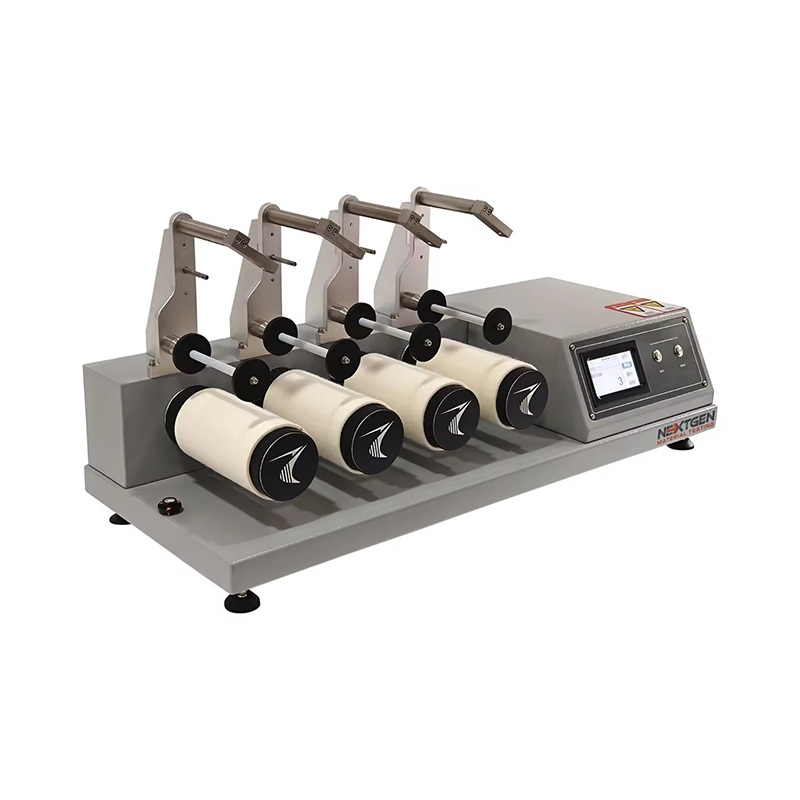
ICI / Mace Snag Tester
Discover the Fabric Textile ICI / Mace Snag Tester, a reliable tool for assessing fabric snagging under normal wear conditions.

Moving Die Rheometer (MDR)
Introducing the NG-MDR Moving Die Rheometer, your solution for accurately assessing the curing and processing characteristics of vulcanized rubber compounds. Designed for precision, this state-of-the-art rheometer captures the characteristic curve and parameters of rubber vulcanization by measuring the torque applied to the oscillating die.
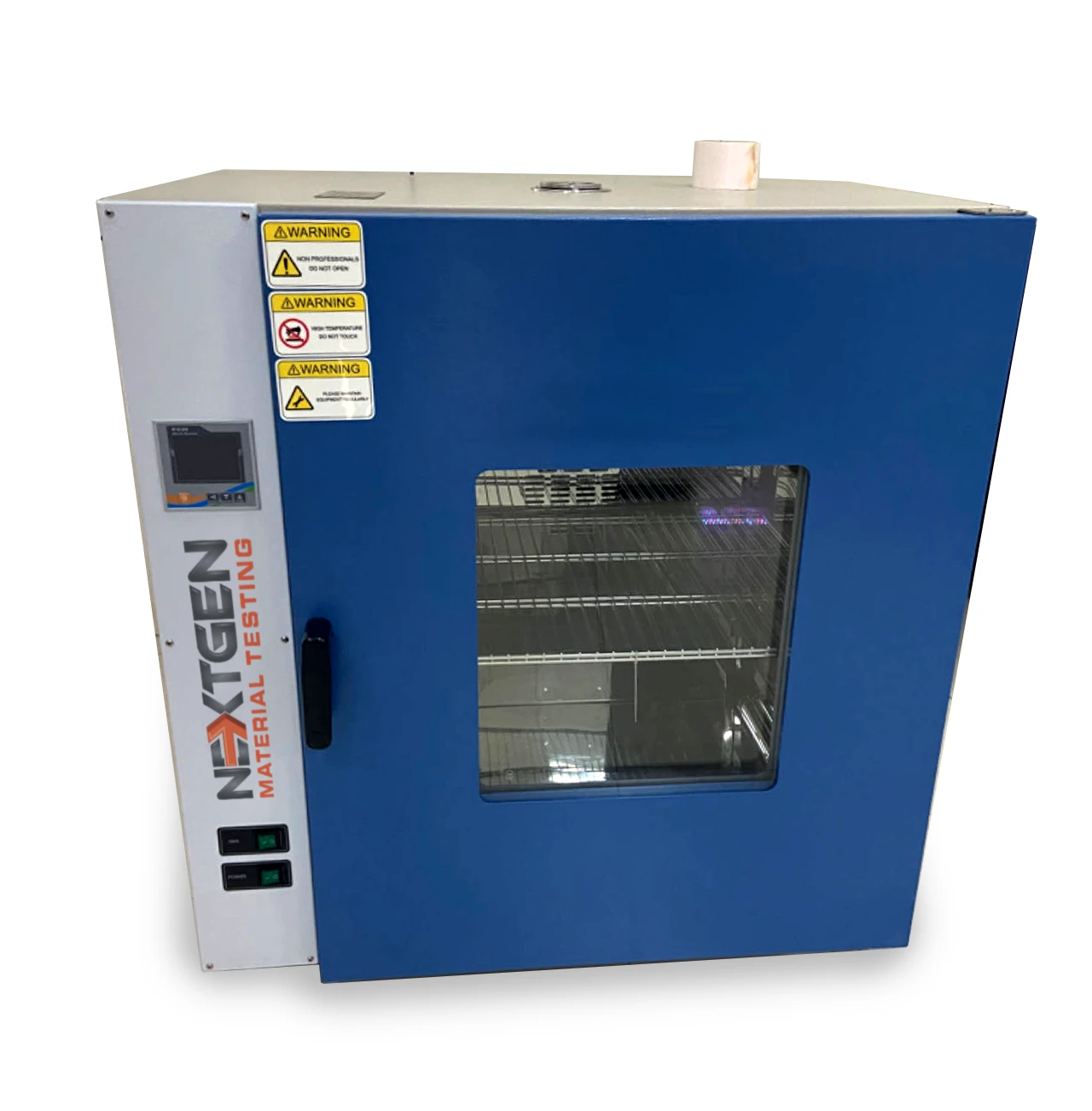
Aging Oven
Our aging oven is well-suited for performing drying, baking, wax melting, and sterilization experiments in industrial and mining enterprises, as well as in laboratories, colleges, and research institutions.
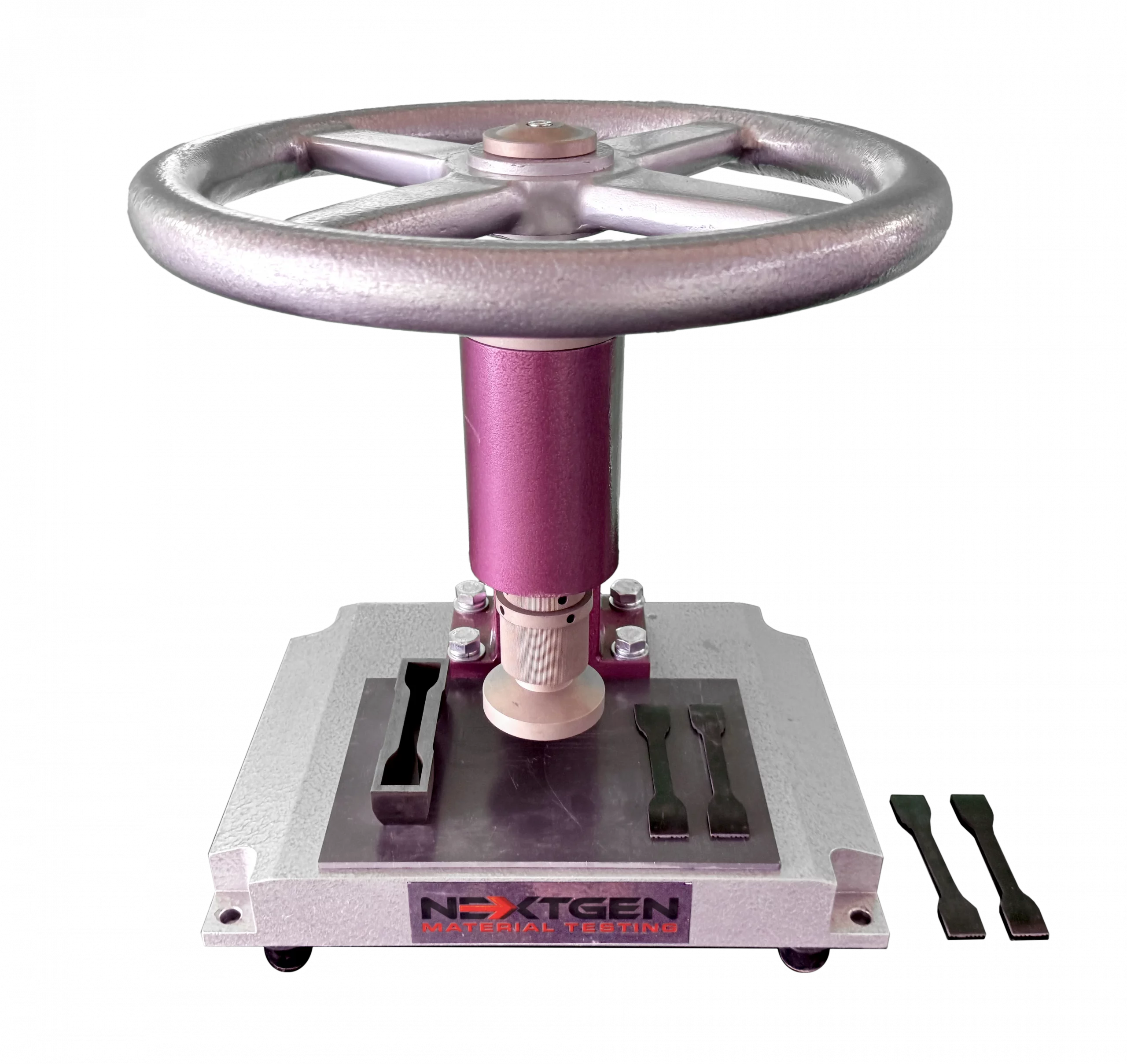
NG-T-Press M Series - Manual Cutting Press System for Rubber Tensile Specimens
Our newest manual cutting press system is suitable for laboratories to create specimens from rubber, tape, and special materials.
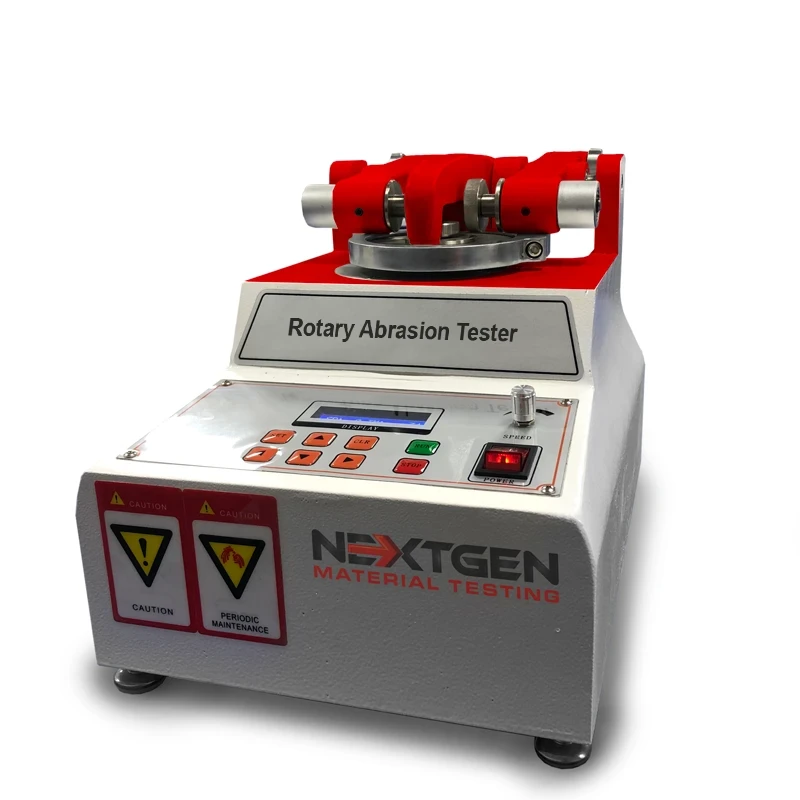
Rotary Abrasion Tester Single & Dual Wheel
GenRotary used evaluate abrasion resistance. It can conduct tests on a wide range of materials such as: cloth, paper, paint, plywood, leather, tile, glass, rubber etc. It tests the specimen by rotating it while in contact with the grinding wheel and applying the required pressure. The Joss of weight reflects on the change in weight of the specimen. The unit also has an intelligent power failure recovery function.
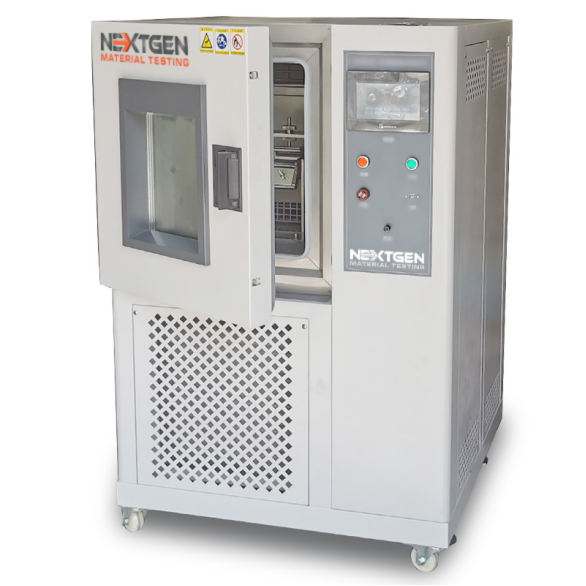
GenRoss-CH - Ross Flex Tester with Low Temperature Chamber
GenRoss-CH is an advanced Ross Flex Tester designed for assessing the cold resistance of materials in low temperature environments.

Linear Taber Abrasion Tester
NextGen's linear abrasion meters evaluate the abrasion and scratch resistance of products, along with color transmission.
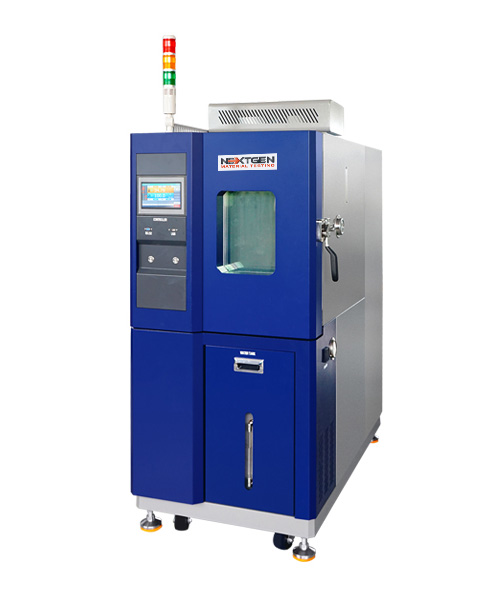
NextGen Environmental Chambers NG-EC 100,150,225,408,1000
The temperature and humidity NextGen Environmental Chambers features a sturdy cabinet made of cold-rolled steel and stainless steel.
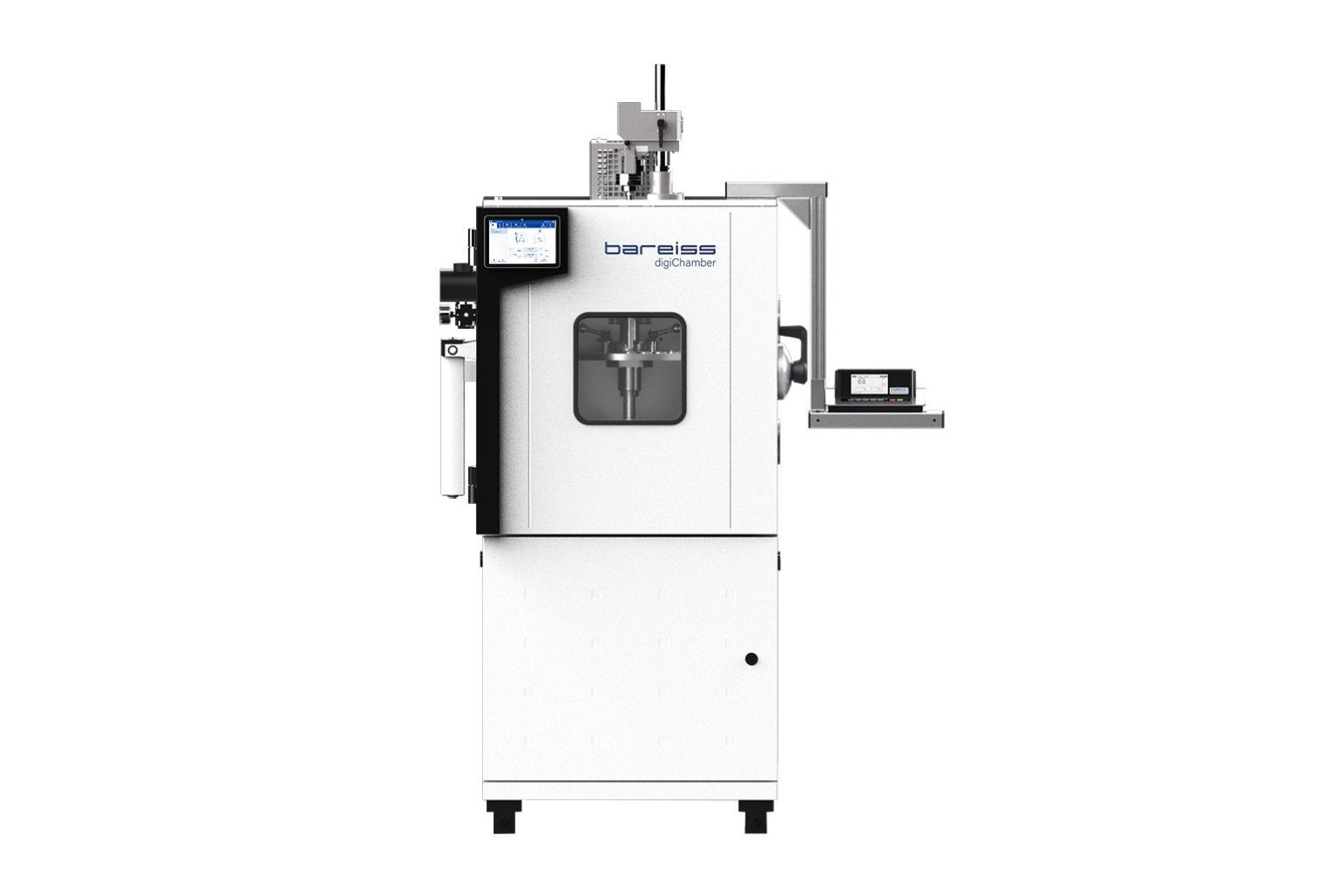
digiChamber - Temperature Controlled Hardness Testing
Discover digiChamber from NextGen Material Testing, the advanced temperature-controlled hardness tester developed by Bareiss.
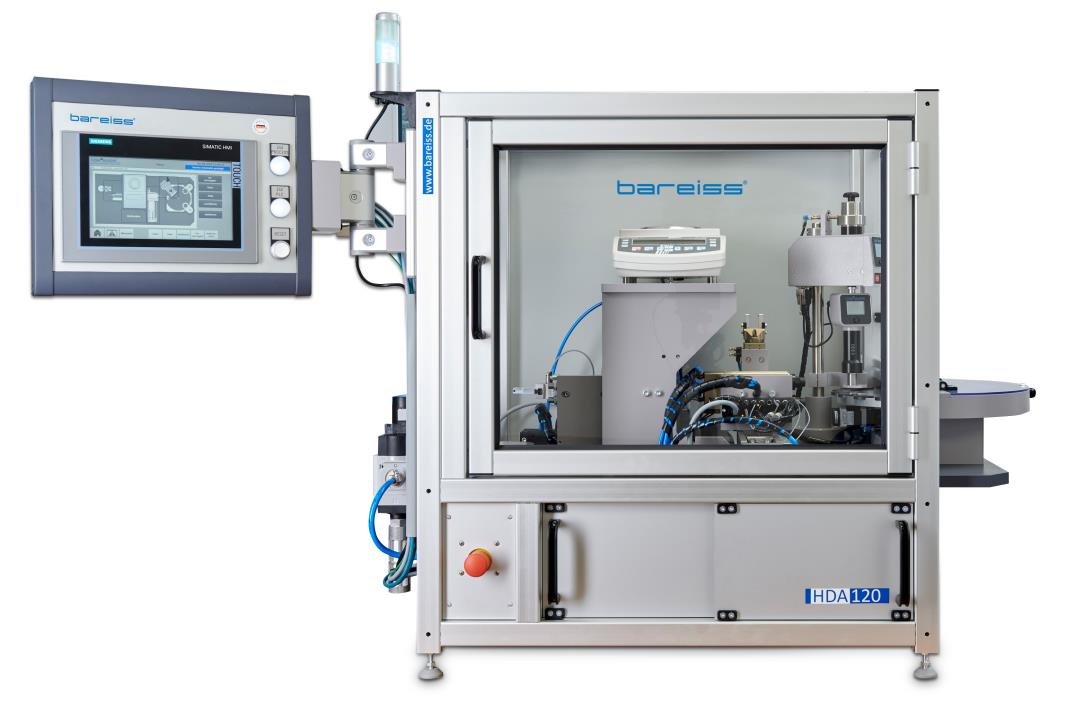
HDA 120 - Hardness and Density Automation Test System
The HDA 120 test system is a versatile solution for semi-automatic detection of sample hardness and density.
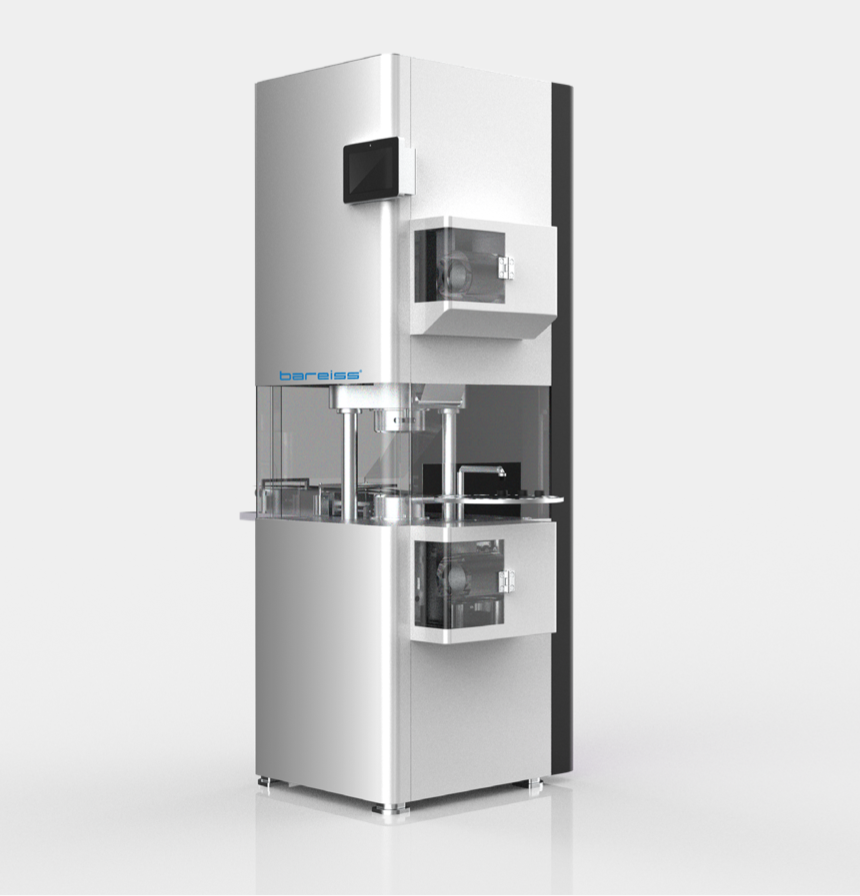
RPA Ultra - Advanced Rubber Process Analyzer Rheometer
RPA Ultra is an advanced rubber process analyzer rheometer that measures the dynamic and static characteristics of raw rubber compounds
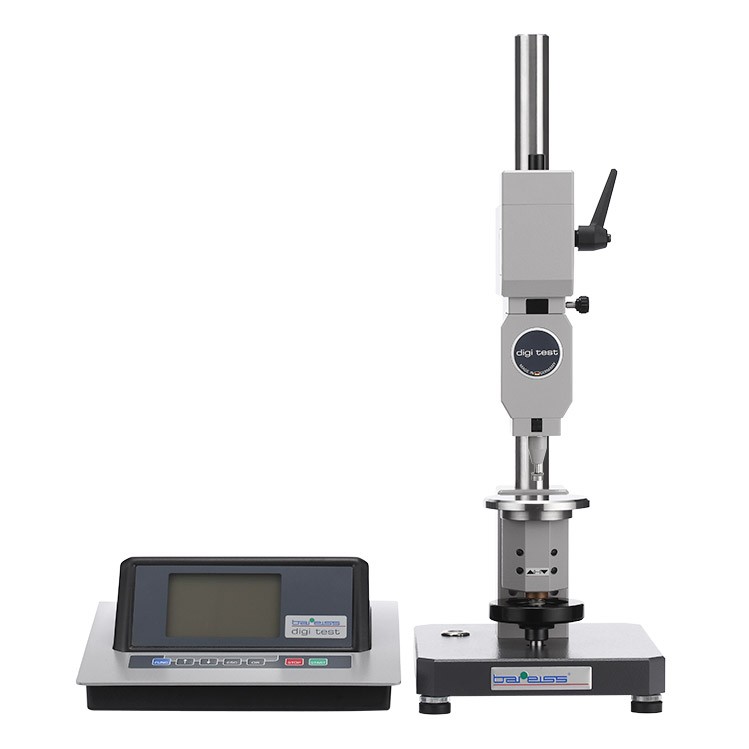
Automatic Shore, IRHD and VLRH Hardness Testing System
NextGen is proud to present our German line of fully-automatic Shore, IRHD and VLRH hardness testing system for plastic materials, plastic and foam compounds for the ultimate precision, accuracy and repeatability, exceptional ease-of-use and maintenance. Experience the industry leader for specimen testing including rubbers, plastics, foams, composites, o-rings, and more.
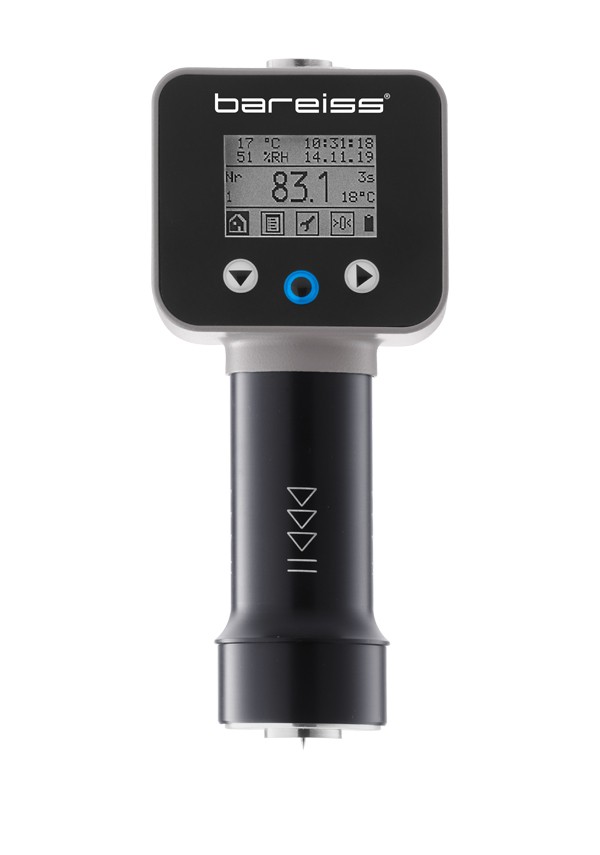
Advanced Portable Shore Durometer System with Test Stand Options
HPEIII is NextGen's advanced German line of equipment that is the new generation of HPE systems ideal for various plastic and plastic compound testing. The new system enhancements offer advantages including temperature sensor, reading values of ambient temperature and humidity, historical hardness value display, larger LCD display, standard USB connection and much more. These advanced portable systems can be paired up with either manual or automatic motorized test stands to help eliminate the human error factor and maximize accuracy and repeatability between test when switching from one operator to the next.
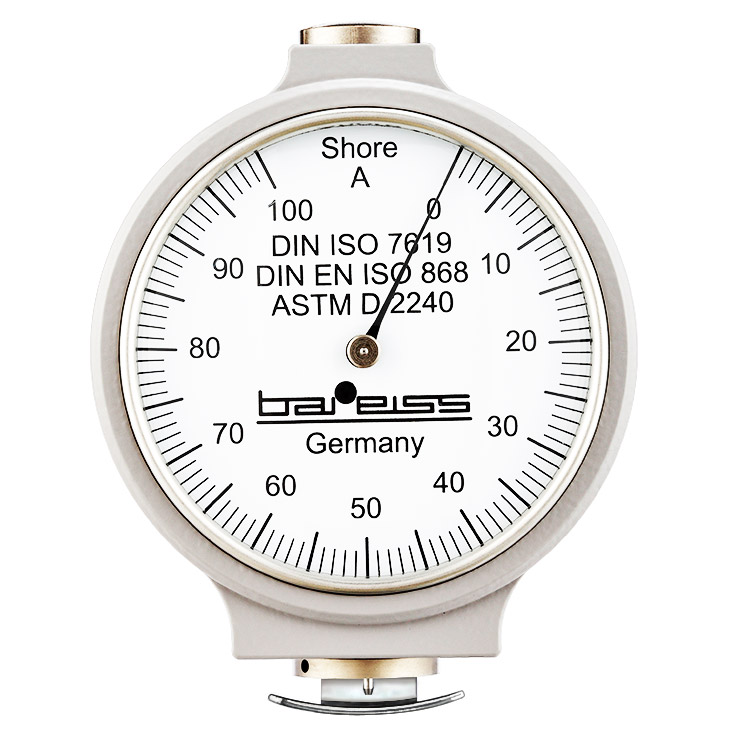
Classic Analogue Shore Durometer with Test Stand Options
This German-manufactured system has been the global benchmark of Shore hardness testing systems since 1954. With ever enhanced ergonomic design, the HP Shore Hardness Tester is both visually appealing and precise rubber and plastic testing system as it has been for nearly 50 years.
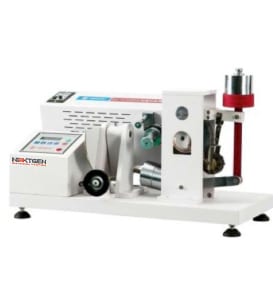
Akron Abrasion Tester
GenKron is used together with a special balance for testing the abrasive consumption of materials. The measurements are done through volumetric loss of a rotating specimen exposed to the action of a standard grinding wheel. It is especially suited for testing harder materials such as shoe soles, tires and other rubber materials.
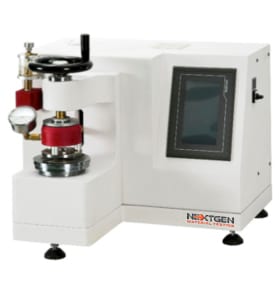
Burst Strength Tester for Fabric
GenBurst is the Burst Strength Tester designed to test anti-rupture strength of variety of materials such as leather, paper and fabric.
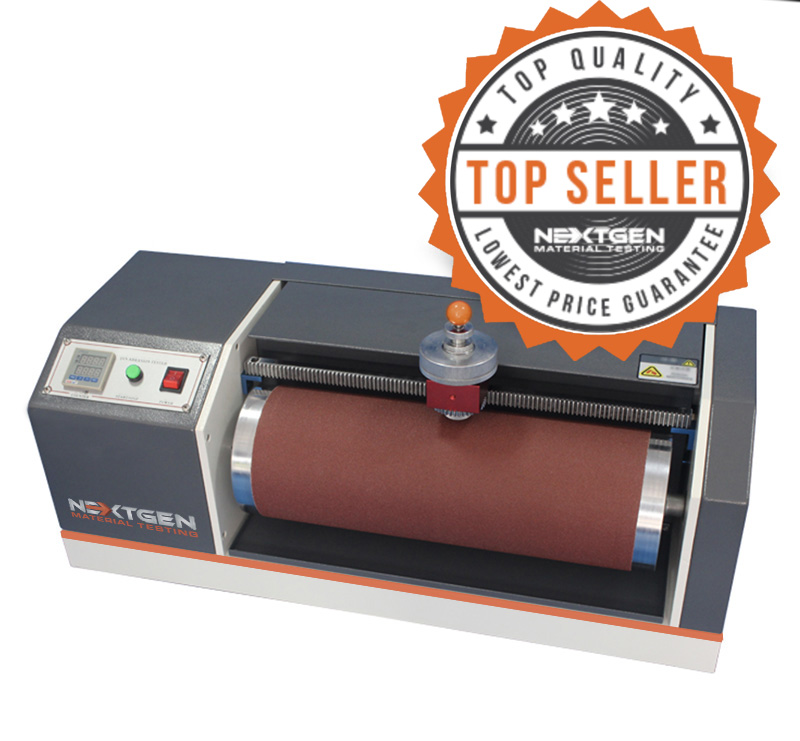
DIN Abrasion Tester
GenDin, is designed to conform to the ASTM D5963 and IS0 4649 standards. This top quality and highly popular abrasion tester will allow you to measure the abrasion resistance of rubbers (vulcanized thermo set rubbers and thermoplastic elastomers) that are subject to abrasive/frictional wear on their actual service. Since wear is always a result of abrasion, different test methods have been developed for the simulation of long term wear.
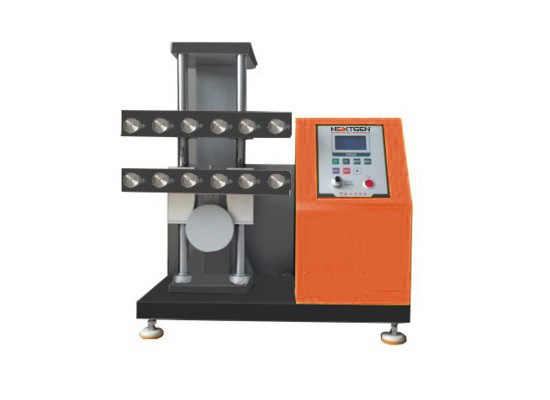
Demattia Flex Cracking Tester
GenFlex tests the ability of rubber products to withstand repeated flexing without developing cracks is of prime importance where such products are used in conditions undergoing repeated flexing. Flexing endurance of rubber products is determined by simulating in laboratory the action of flexing repeatedly under standard conditions of speed, mode, and degree of flexing.
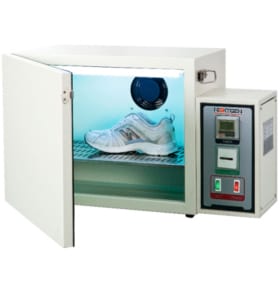
Discoloration Meter
The machine is used to simulate an environment of sunlight radiation on a specimen to identify the resistance of fabric to discoloration.
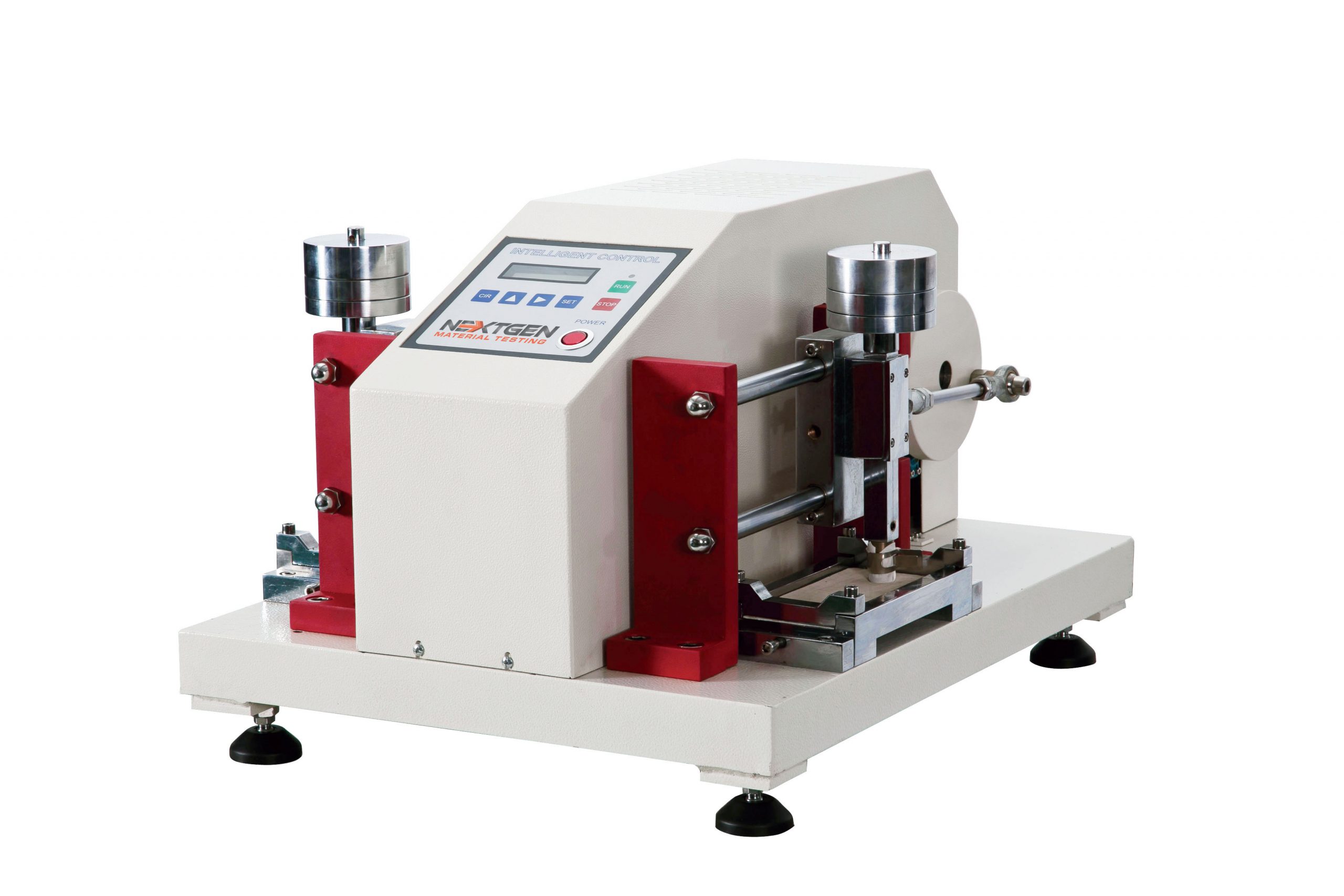
Electric Crocking Tester - GenCrock
The machine is used to test the dyeing of the fabric, and the fade degree of the leather after dry or wet rubbing. The test method involves the specimen to be fastened to the base of the crocking meter and rubbed with an abrasive hammer attached to a wet or a dry cloth under controlled conditions. The transfer of colour is then measured using a scale to evaluate the rating of the specimen's dyeing grade.
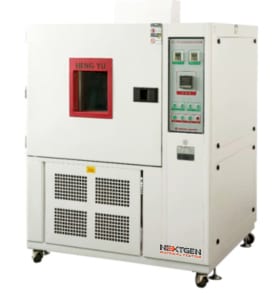
Freezing Tester - GenFreeze
GenFreeze is specially designed to test the characteristics of various materials in a cold environment to ensure suitability for use in a cold climate. Based on the testing demand, adjust the beater and flexing grip, then load to the desired position. It can be used to test rubbers, leather, and plastics, PU leather etc. The unit can be adjusted to meet different requirements.
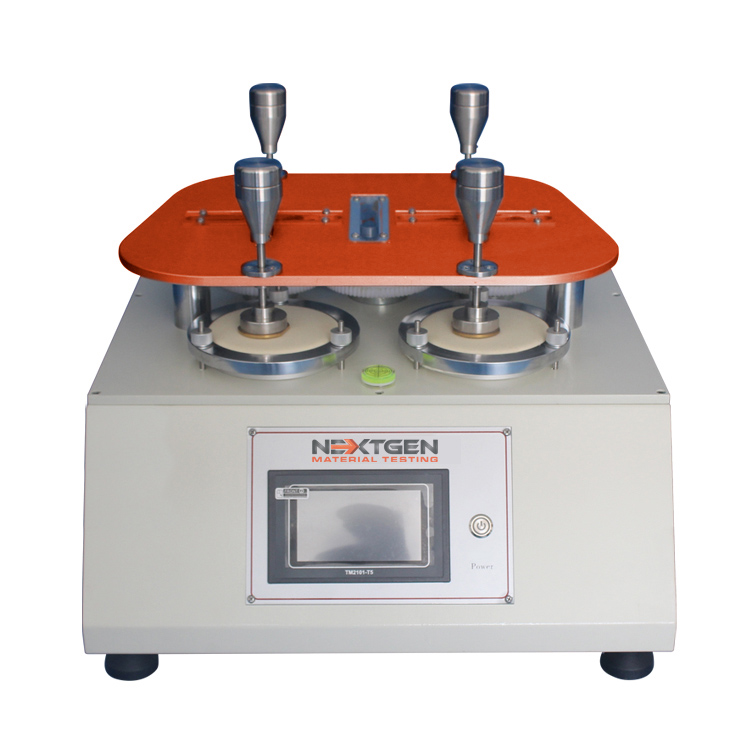
Martindale Abrasion Tester - GenDale
GenDale is mainly used to test shoe fabric, shoe lining, and many other types of shoe related materials. The unit can test up to four specimens at the same time for abrasion. The fabric specimen is measured by having rubbing applied on it via a complex direction of back and forth motion. The accuracy of abrasion strength is determined by the specific number of cycles conducted until a hole appears in the test area of the fabric specimen.
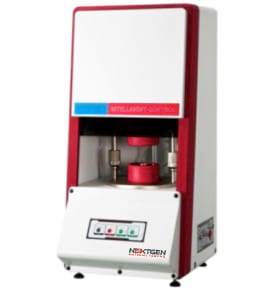
Mooney Viscosity Testing Machine - GenMooney
GenMooney is a viscosity testing machine is applied to measure the viscosity of the unmixed or mixed unvulcanized natural rubber, synthetic rubber and regenerated rubber .This tester has many functions such as fast warming, maintaining temperature, data stability, etc. It is equipped with an automated calibration feature for a simple data calibration of each experiment.
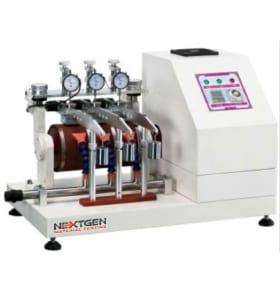
NBS Rubber Abrasion Tester - GenNBS
GenNBS is used to test the abrasion resistance of vulcanized rubber or other rubber compounds. It is commonly used for the soles and heels of footwear. It has an intelligent power failure recovery system. The unit conducts measurements through volumetric loss of specimens exposed to the action of a normalized abrasive medium secured to a rotations cylinder.
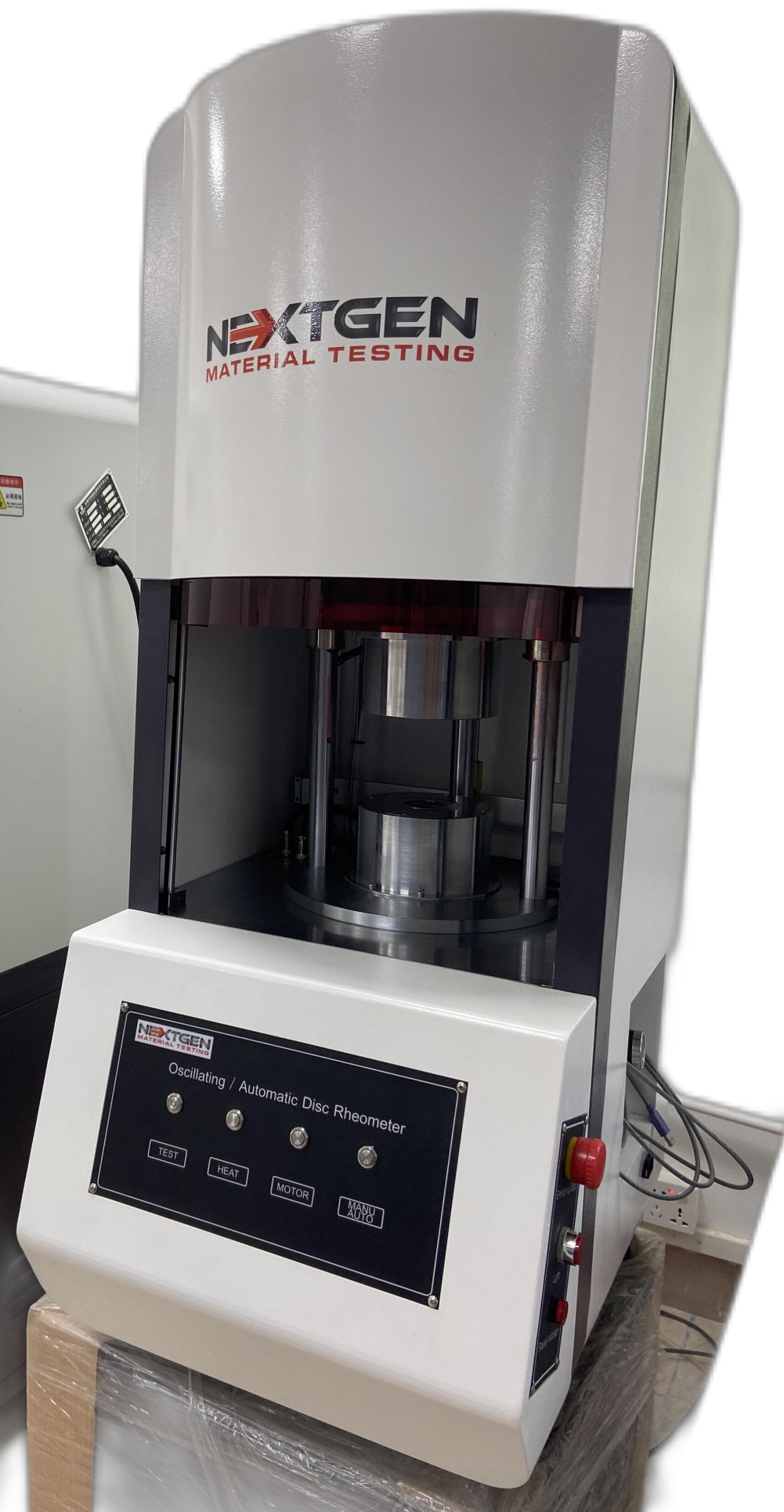
Oscillating / Automatic Disc Rheometer (ODR)
This machine is designed to get the characteristic curve and characteristic parameters of rubber vulcanization by measuring the applied moment of rubber to the oscillating dye body. NG-ODR rotor-free vulcameter has an excellent stability of results. The data and diagrams can be used as a reference for development, research and production quality.
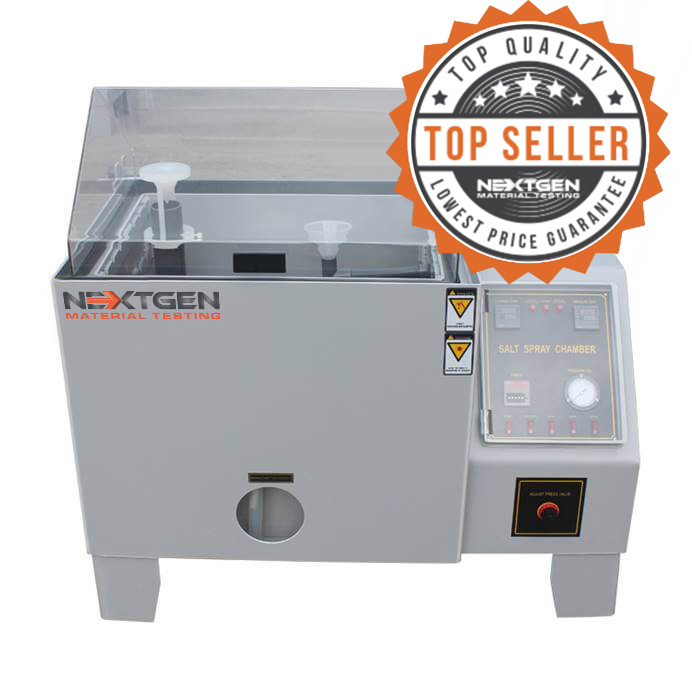
Salt Spray Tester - GenSalt
GenSalt is designed to test the surface of different materials for resistance to corrosion. The unit is commonly used to test coated materials of a metallic nature in a controlled corrosive environment. The test can be used on rust-proof painting, anodizing, electroplating and rust-proof of grease. The machine imitates expedited corrosion process via salt spraying on a given test sample to identify the corrosion (oxides) resistance. Test results are based on the longevity of time a material can resist visible corrosion on the test sample.
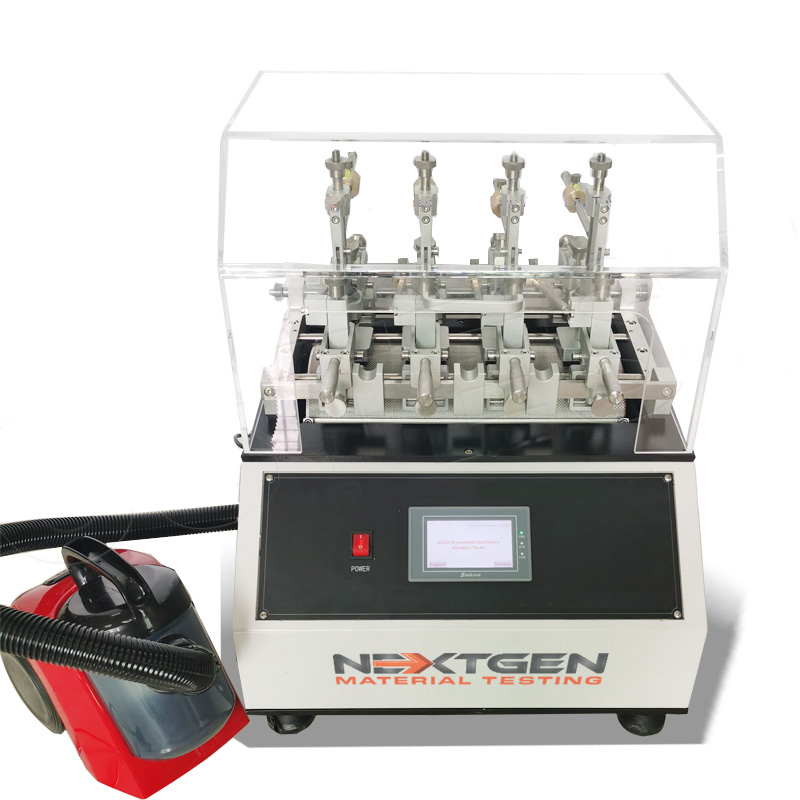
Wyzenbeek Abrasion Tester - GenWyze
The machine is designed to test the abrasion resistance of fabrics and metals. The abrasion of fabrics is tested when the specimen is pulled over the frame and rubbed against an abradant over a curved surface. The number of cycles, also known as double rubs, conducted on the specimen before the fabric shows visible wear is used to determine the rating of abrasion.

Vertical Rebound Resilience Tester - GenRebound
GenRebound tests the resilience of rubber compounds. The machine must be adjusted in a horizontal position and the plunger raised at a specific height. The plunger is then released onto the specimen for a given number of impacts. The measurements are based on the 4th, 5th, and 6th impacts. The average of the three (3) measurements is then calculated for the test result. The machine is highly useful in production of compounds designed to absorb vibration or shock according to the ASTM standards.
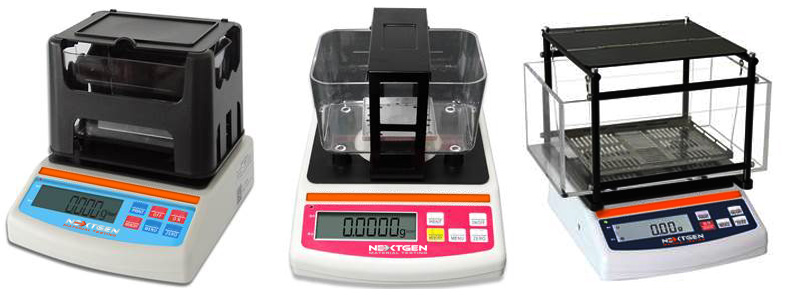
Digital Densimeter Systems
Description The NG-DM-A Series offers high-accuracy digital Densimeters designed for a wide variety of material testing needs. These elegant and compact densimeter systems offer capacity ranges from 150g to 3000g with accuracy of 0.001g/cm3 down to 0.0002g/cm3. Advanced Densimeter System […]
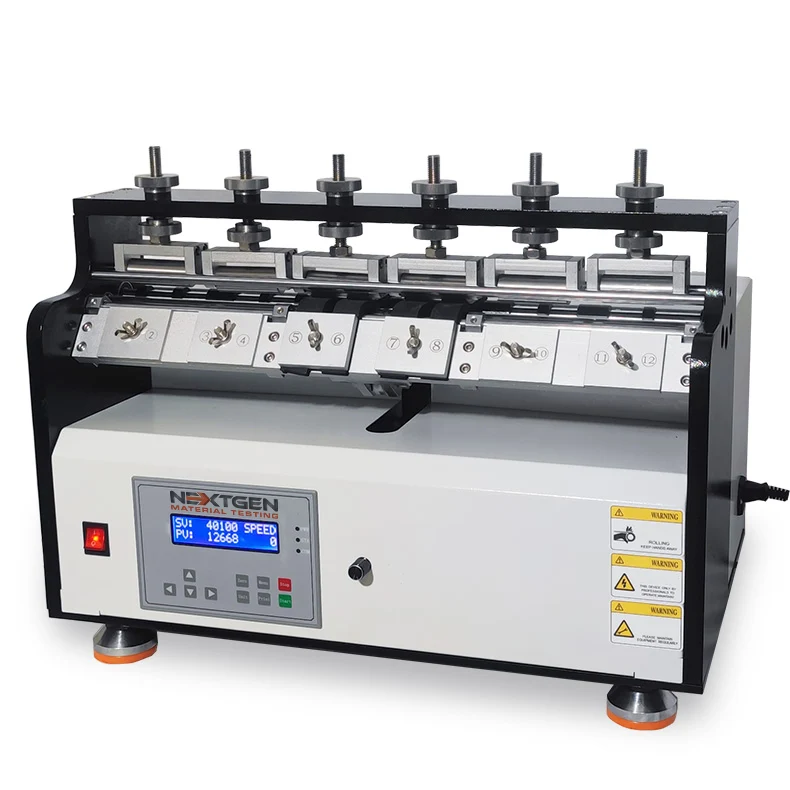
Ross Flex Tester
Ross Flex Tester is designed to determine the resistance of vulcanized or synthetic elastomers to cut growth. The system does so under continuously bend flexing in 90°.
